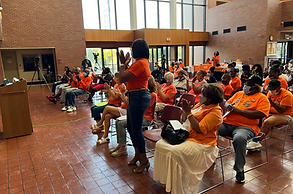
Mayoral
An equitable community is one where everyone is included in the full benefits of society. In such a community, everyone is treated with fairness and justice and empowered to participate fully in social, cultural, and economic life.
Build Black Mayoral Power
Build Black Mayoral Power to expand the capacity of local leadership. This will not be limited to mayors. We will include local office holders and stakeholders. Our goals will be geared toward:






Co-Producing
-
The need to merge scientific with societal knowledge in addressing sustainability challenges that deepen research using a methodology known as co-producing knowledge. It differs from participatory approaches by holding potential for solution-oriented research through sustained relationships with actors across disciplines and sectors. Science with policy and city residents on the other hand, is where scientists, policymakers and city residents have an equal chance to be producers of knowledge. The position of policymakers and city resident’s changes, from end-users to co-bearers of knowledge with scientists. This is interdisciplinary learning.
Cities Strategies
-
There are 3 Pillars of sustainability for cities:
-
Economic viability
-
Environmental protection
-
Social equity
-
The term sustainability is broadly used to indicate programs, initiatives and actions aimed at the preservation of a particular resource
However, it refers to four distinct areas: human, social, economic, and environmental – known as the four pillars of sustainability.
We will reach out to Black mayors in the Midwest/South to get their thoughts around meeting other similarly situated Mayors. We will look at specific things like:
• Crime Rates
• Police Policy
• Budgets
-
Create space for organizers and other power building entities to join conversations with Mayors
-
Important for 2 reasons
-
Policy fronts: do they understand they are in a region with support? Hope: do they understand that a regional approach can boost and manifest critical wins for the community? To offer them the opportunity to collaborate with Faith in Action to create community change/power for the people?
-
A Summit type of relationship (indoctrinate them in organizing, what people really want, etc.). What do they know about using policy, power--is there a poor people’s agenda?
-
Money front (intent around money): Can Mayors be trained to put money in places to help poor people? Help find money for federations and CBOs?








A large-scale campaign
Priorities & Meetings
-
1-1s with strategic (Black) mayors
-
Meeting with Black community leadership
-
Support a clergy led community development training in strategic cities
-
Invest time in ALL the leadership to prep for a Listening Campaign
Teams
-
Power Clergy
-
Black Mayors+
-
Federation Black Leadership+
Commit to Ongoing Learning and Long-Term Transformation
The work of building and maintaining an inclusive, racially equitable culture is never done. The personal work alone to challenge individual and professional socialization is like peeling a never-ending onion. Municipalities and regions must commit to sustained steps over time, to demonstrate they are making a multi-faceted and long-term investment in the culture, if for no other reason than to honor the vulnerability that folks bring to the process. This work is hard and takes a deeply personal toll. The process is only as good as the commitment, trust, and goodwill from the professionals and leadership who engage in it, whether that’s confronting one’s own fragility or sharing the harms that one has experienced over the years.
The opportunity here is to learn, work and build across difference, even at the cost of conflict. Conflict is an inherent part of interrupting the patterns that maintain structural disadvantages around issues such as hiring, pay equity, and advancement. Similarly, it is risky and uncomfortable to point out racist and inequitable dynamics when they show up in daily interactions, such as the treatment of people of color in meetings.








We will integrate all of this into packages represented in these ways:
Black Leadership in Midwest and South
-
Regularly scheduled bi-monthly meetings
-
Create roles for the team for ownership and accountability
-
Create a calendar of events to see how our work overlaps, see connections in the work, set a learning community, see a regional overview
-
Set base building goals
-
Setting a regional goal to train 300 leaders over the course of the year.
Base Building leading to → Research Actions → Elections → Wins!
-
What does the organizing plan look like for each city?
-
What are the peak moments?
-
How are leaders leading this effort?
-
What wins are attainable?
-
-
Fundraising:
-
Create a survey to understand what are the funding needs.
-
Create a white paper to describe the work going on the in the Regions
-
At the end of the Months, have 1 funder briefing
-
-
Clergy……..
-
Youth…….
-
Political Leadership (Mayors in this case, especially Black mayors)
-
Continue to reach out to all the participating Mayors in the Midwest and South to get their thoughts around meeting other similarly situated Mayors. Look at specific things like:
-
Crime Rates
-
Police Policy
-
Budgets
-
Democracy opportunities
-
-
Create space for community folks to join conversation with political leadership, to include Mayors
-
Important for several reasons
-
Policy fronts:
-
do they understand they are in a region with support?
-








Hope
-
do they understand that a regional approach can boost and manifest critical wins for the community? To offer them the opportunity to collaborate with capacity builders to create community change/power for the people?
-
A Summit type of relationship (indoctrinate them in organizing, what people really want, etc.). What do they know about using policy power--is there a poor people’s agenda?
-
Money front (intent around money): Can Mayors be trained to put money in places to help poor people? Help find money for federations?
Federations
-
(In the Midwest)
-
(Other Regions are possible)
-
Deep partnership with local leadership in moving key mayors around a people’s agenda
